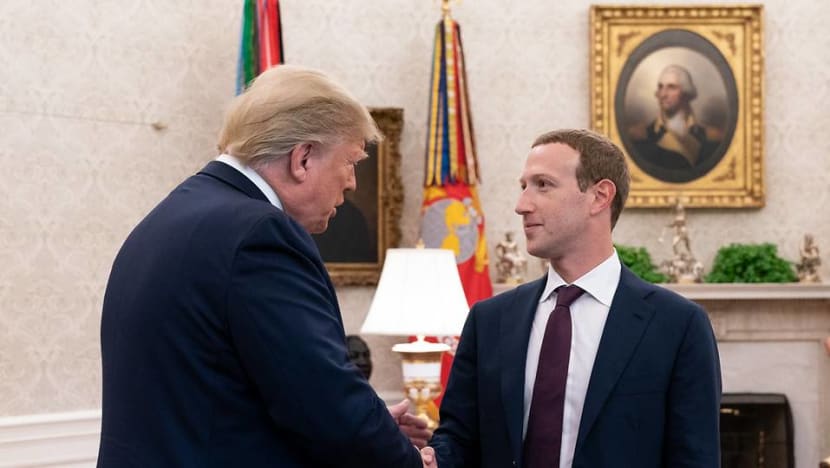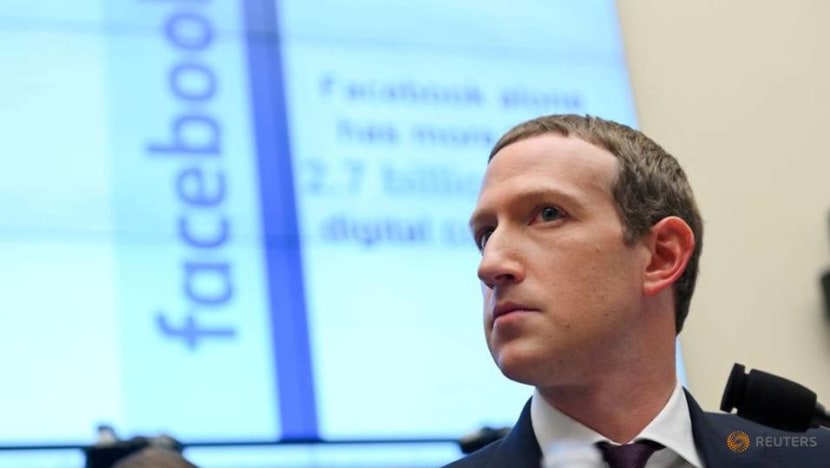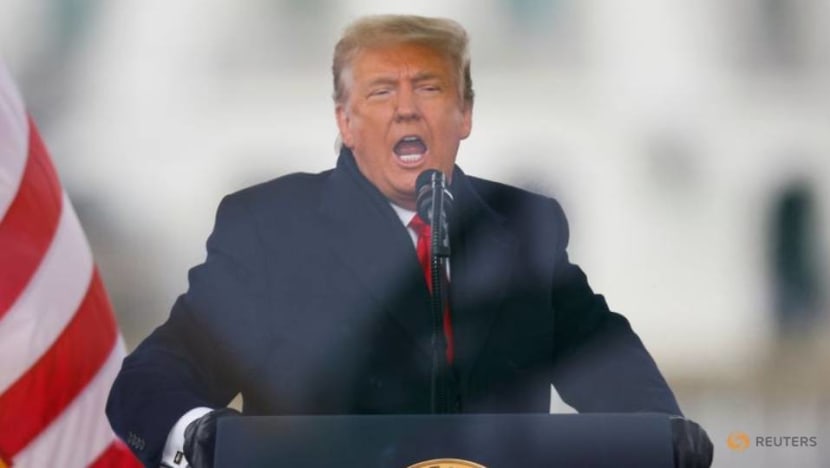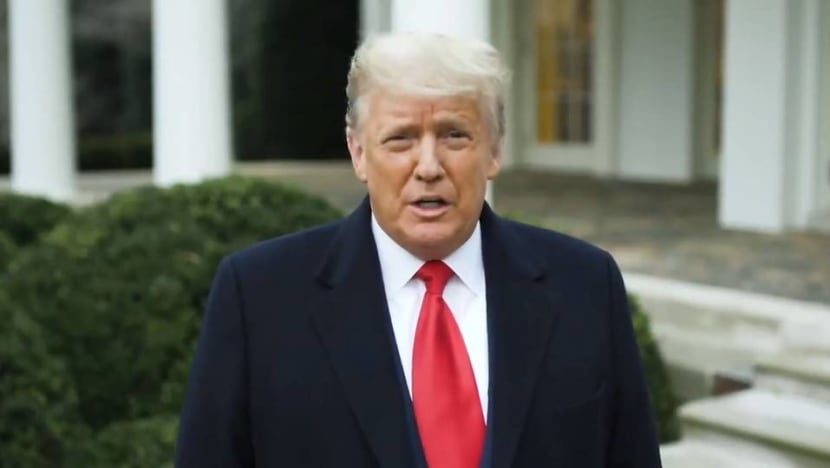commentary Commentary
Commentary: Facebook’s eleventh-hour suspension of Trump’s account raises questions about its motives
Facebook’s decision to deplatform the president “indefinitely” appears altruistic but the company’s track record suggests another explanation, NTU's Mark Cenite argues.

Facebook chief Mark Zuckerberg met US President Donald Trump and members of the Congress on Sep 19, 2019. (Photo: Twitter/realDonaldTrump)
SINGAPORE: We have seen over the last two days what truly matters to US President Donald Trump and what could get him to change his rhetoric following the storming of Capitol Hill: Taking away his Twitter and Facebook accounts.
Suddenly he condemned the riots and conceded the election.
We can’t read Facebook CEO Mark Zuckerberg's mind, but there are two competing explanations for his decision to suspend Trump’s account for the remaining thirteen days of his presidency — after four years of allowing his posts to remain uncensored.
The first possibility: All along, Facebook has been acting in good faith, with an eye toward the public interest.
For years, Facebook stuck to its principles of maximising open debate on its platforms, giving the public every opportunity to scrutinise the unfiltered posts of the world’s most powerful man.
It resisted pressure to censor Trump from fierce critics on the left. It put principles ahead of profit when it refused to cave to advertisers who boycotted its platforms for one month year last year because of failures to control disinformation and hate speech.
Then Trump finally crossed Facebook’s standard for deplatforming last week.
READ: Commentary: Trump spent weeks insisting the election was stolen. No surprise his supporters took him seriously
READ: Commentary: No moving on from US Capitol insurrection until guilty are held to account
The second possibility: Facebook acted opportunistically.
Since there’s no need to cosy up to a lame-duck president who has little time to retaliate, Zuckerberg finally suspended Trump to score publicity and appease critics, now that there is little to lose. Advertisers can take refuge behind the fact that the platform finally took a stand.
Based on the track record, it’s hard not to conclude that Facebook played it smart and followed its business interests.
VENEER OF PRINCIPLE
The social media giants have to date been adamant about allowing politicians to post freely on their platforms.
In May last year, Zuckerberg argued, “Political speech is one of the most sensitive parts in a democracy, and people should be able to see what politicians say”.
In 2019, Zuckerberg explained Facebook doesn’t fact-check political ads — and therefore doesn’t take down ads containing falsehoods — because “we think people should be able to see for themselves what politicians are saying”.

If such principles applied while Trump made what many interpreted as veiled threats against the Black Lives Matters protesters, why don’t they apply now?
If the justifications held for the last two months, while Trump has been raging that the election was stolen despite the evidence and dozens of court rulings to the contrary, shouldn’t they apply in these final days when Trump may be at his most erratic?
What’s more, though Trump lost, his voice will remain relevant. Almost 47 per cent of voters supported him. That’s 74 million Americans. He may run again in 2024.
In a democracy, citizens need to evaluate the positions of the leader of a political party — some call it a movement within a party — so they can choose to condemn or support it.
But not any more?
READ: Commentary: Facebook’s floundering response to scandal is part of the problem
READ: Commentary: Is Facebook cosying up to US President Donald Trump?
WHY FACEBOOK CHANGED COURSE
Zuckerberg says this time is different.
He explained: “We believe the risks of allowing the president to continue to use our service during this period are simply too great”.
The last straw was Trump’s posts that, in Zuckerberg’s words, “condone rather than condemn the actions of his supporters at the Capitol building”.
For weeks, Trump had been promoting his supporters’ “Stop the Steal” protests set for Jan 6, the day Congress met to certify Joe Biden’s election win.
On Dec 18, Trump posted, “Be there, [it] will be wild!"
On Jan 6, outside the White House, Trump addressed the crowd: “We’re going to the Capitol”. He spoke of a need to “fight” and said, “You will never take back our country with weakness”.

Trump then retreated to the White House while his followers climbed the walls and broke windows to enter the capitol. A protestor was photographed sitting in House Speaker Nancy Pelosi’s office chair.
Five people have died, including a police officer and a woman whom police shot. Scores were arrested.
While the protests continued, Trump posted a video in which he told the protesters, “We love you” and “You’re very special”. He repeated false claims that the election was “fraudulent” and “stolen”. He told them to go home.
Shortly after, Trump posted: “These are the things and events that happen when a sacred landslide election victory is so unceremoniously & viciously stripped away from great patriots”. “Remember this day forever!” he said.
READ: Commentary: Imagine a world with more than one Facebook. Here’s why you can’t
Facebook deleted the video and suspended Trump for 24 hours. Twitter hid three of the tweets and suspended Trump from posting for twelve hours after he deleted them but then reinstated his account.
DOES IT COUNT AS INCITEMENT?
Until this week, Zuckerberg said that it merely labelled problematic posts “because we believe that the public has a right to the broadest possible access to political speech, even controversial speech”.
He continued that “the current context is now fundamentally different” because of Trump’s “use of our platform to incite violent insurrection against a democratically elected government”.
Both Facebook and Twitter espouse allowing debate but draw the line at incitement, a term in their content guidelines.

Incitement is a well-established exception to freedom of expression in American law.
Authorities are not allowed to censor unless expression rises to intentional provocation to unlawful action likely to happen imminently. The rationale is that as long as there’s time to talk a speaker out of doing something illegal, censorship is not justified.
Applying the test to Trump’s social media posts, he can be stopped when he is provoking an assembled mob to break the law — as he was arguably doing on Jan 6 — but not when he is merely advocating protests.
In May last year, Trump reacted to protests against the police killing of George Floyd by posting, “When the looting starts, the shooting starts”. Zuckerberg explained that he chose not to censor the posts because the president wasn’t inciting violence, but warning that law enforcement might legally use force against looters.
This week, did Trump’s praise for the rioting come closer to meeting the legal definition of incitement?
READ: Commentary: Donald Trump aims to win the US election, one way or another
READ: Commentary: Why did George Floyd protests gain traction worldwide – including Asia?
As deplorable as Trump’s words were, I doubt that they actually would qualify as incitement. Based on precedent cases, the requirement of imminent action makes the legal standard almost impossible to meet. In the video, Trump told the rioters to go home peacefully.
Because the law doesn’t apply to social media companies, they are free to interpret their guidelines as they wish.
But since Zuckerberg was so strict in his application of incitement to the “looting/shooting” post, it’s hard to understand why a loose interpretation of the term is now justified.
Similarly, it’s hard to understand why the dramatic solution of deplatforming, so objectionable in the past, is suddenly acceptable.
It is possible that Zuckerberg, who takes credit for his company’s decisions in big cases like this, is just a neutral referee.
But the company’s track record makes a more cynical interpretation almost irresistible.
Dr Mark Cenite is Associate Dean (Undergraduate Education) at Nanyang Technological University’s College of Humanities, Arts, & Social Sciences. He teaches communication law at the Wee Kim Wee School of Communication and Information.
Listen to Prof Chan Heng Chee and BowerGroupAsia Managing Director James Carouso explain how America came to be so deeply divided amid a bitterly fought election on CNA's Heart of the Matter podcast episode published in November 2020:












